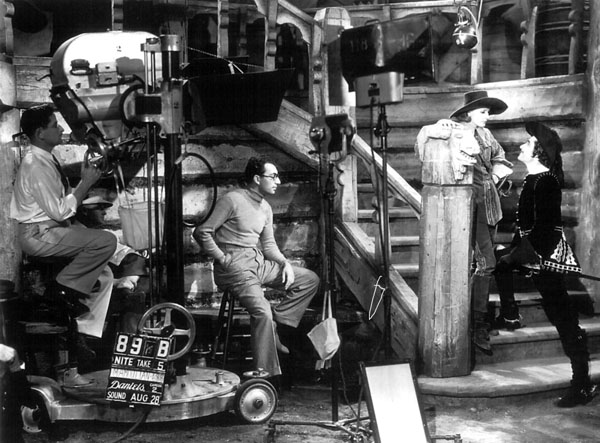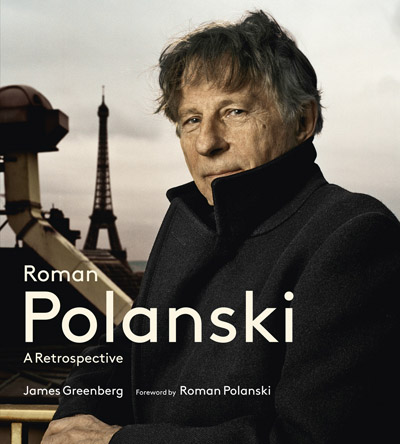We begin this weekend update with a round of book reviews. For the TLS, Philip French writes that Rouben Mamoulian’s “place in the history books as a major figure in the development of the cinema is assured—as a master stylist, a metteur en scène perhaps, rather than an auteur.” On, then, to the books at hand:
In a valuable study of Mamoulian published in 1969, Tom Milne (then deputy editor of Sight & Sound) quotes a remark by Andrew Sarris in The American Cinema: Directors and directions 1929–1968, a book that influenced a generation of critics. This same remark is given a prominent place in two new American books, Mamoulian, a brisk, well-researched survey of the life and work by David Luhrssen, the arts and entertainments editor of the Milwaukee newspaper the Shepherd Express, and “On My Way”, a wide-ranging monograph by the music critic and cultural historian Joseph Horowitz, who sets out to establish that Mamoulian’s contribution to George Gershwin’s epic folk opera Porgy and Bess was crucial. Mamoulian appears in a section of Sarris’s book headed “Less Than Meets the Eye,” and it begins with the line that Milne, Horowitz and Luhrssen quote, giving it a lapidary, judgmental status: “Mamoulian’s tragedy is that of the innovator who runs out of innovations.” Sarris’s aphoristic assessment may be right, wrong or somewhere in between, and the term “tragedy” seems a little strong. It is pretty clear, however, that it damaged Mamoulian’s reputation, and Luhrssen and Horowitz have it in mind as they set out to explain and rehabilitate him.
The Washington Post‘s Jonathan Yardley reviews the second book as well, quoting the crux of Horowitz’s argument: “[I]t was Mamoulian who transformed DuBose Heyward’s 1925 novella Porgy from a quasi-realistic regional cameo into an epic theater work, a parable of suffering and redemption.”
“Celebrity was a fresh concept at the beginning of the last century,” writes Steve Appleford in the Los Angeles Times. “In his richly illustrated Still: American Silent Motion Picture Photography, David S. Shields examines the groundbreaking work of the early cinematographers and still photographers who created that phenomenon. Shields is both scholarly and deeply passionate about the pictures (some from his own collection), gathering rare images from the sets of epic costume dramas and the kind of celebrity portraiture that would reach its ultimate expression generations later in Vanity Fair and Rolling Stone.”
And we’ve got another round on My Lunches with Orson, “a collection of off-the-cuff conversations between filmmaker Henry Jaglom and Hollywood lion Orson Welles,” as James Hughes sums it up for the Paris Review. “The seemingly endless fascination with Welles as an interviewee shows no signs of slowing, though it’s worth noting how exceptionally he performed when the roles were reversed.” Hughes gives us the clip above, taken from Around the World with Orson Welles, “an obscure series of shorts he made for European television in the midfifties.” Here, “he corners a pocket of avant-garde poets led by Romanian provocateur Isidore Isou, who founded the Lettrism movement, which attempted, in part, to shatter the alphabet and replace it with fresh, bombastic sounds.” Welles “appears to be both fascinated and skeptical.”
You’ll find more on My Lunches with Orson from Charles Matthews in the Washington Post—and from Peter Aspden in the Financial Times, where he also reviews two more volumes. Nicolas Roeg’s The World Is Ever Changing is a “relaxed account of his cinematic career [that] couldn’t be more different from Welles’s firework-chats with Jaglom. Roeg has also had to deal with the negotiation of a long and gradual creative decline after the succession of masterpieces—Performance (1970), Don’t Look Now (1973), Bad Timing (1980)—that made him the most innovative talent of 1970s British cinema. But his reflections here are gently observed, lacking in any bitterness or regret, and containing not a whiff of scandal…. Roeg’s work is probably best read as an ebook, which has been designed exclusively for iPad, complete with sequences from his films and grandfatherly accounts of their making, which ramble sweetly into occasional dead ends.”
And then there’s James Greenberg’s Roman Polanski: A Retrospective, “a more conventional book, produced with the director’s evident blessing (he contributes a foreword), but still unafraid to comment on the weak spots in a variable career. Greenberg’s dilemma is obvious: Polanski’s life has always been more interesting than his art, and once those bare biographical facts have been cursorily acknowledged—the death of his pregnant mother in Auschwitz; the murder of his wife Sharon Tate by the Manson family; the arrest for sexually assaulting a 13-year-old girl and subsequent flight from the US—it is hard to avoid the feeling of anticlimax when we turn to the actual work.”
More reading. Nick Pinkerton‘s a fan of Norm Macdonald, and in particular of the “minor classic,” Dirty Work (1998), directed by Bob Saget.
In other news. Claire Denis and Lav Diaz are the latest filmmakers to join the roster of the Venezia 70: Future Reloaded project, celebrating the festival’s 70th anniversary.
London. It’s A Weekend of Anger: the Films of Kenneth Anger at the ICA.
In the works. Even with his adaptation of Patricia Highsmith’s novel Carol still on (and with Cate Blanchett and Mia Wasikowska lined up to star), Todd Haynes is working on Act of God and has offered the lead to Christian Bale (who’s appeared in Haynes’s Velvet Goldmine and I’m Not There). The Playlist‘s Kevin Jagernauth: “If Bale takes the part, he’ll play a regular Kansas man who gains notoriety across the nation after taking his local government to task following a devastating tornado.” Last year, Haynes told Todd Gilchrist: “It’s sort of about the great middle of this country and their sort of suspicions about government. And how that keeps clicking into conservative politics and the way the right makes use of those uncertainties…. It’s been too effective, that allegiance, for too many years, and I’m curious about it.”
While I was out and about earlier this month, I missed another item from Kevin Jagernauth, the news that Whit Stillman‘s casting his next film in Manhattan. Stillman’s told the New York Post, “It’s based on a funny but obscure late 18th-century work that reads a bit like an Oscar Wilde play.” KJ: “But according to sources close to the production, that 18th century work is actually Jane Austen’s little known and perhaps less celebrated Lady Susan, and it will be adapted into a film currently titled Love and Friendship.”
Spike Lee introduces his “Essential List of Films for Filmmakers“
“The team behind award-winning Sundance film Ain’t Them Bodies Saints has set its next project, tapping Jason Schwartzman and Elisabeth Moss to star in writer-director Alex Ross Perry’s indie drama Listen Up Philip.” Jeff Sneider has more at TheWrap.
Will Forte, Rhys Ifans, Lucy Punch, and Tatum O’Neal are joining Jennifer Aniston, Imogen Poots, and Owen Wilson in Peter Bogdanovich’s Squirrels to the Nuts, reports Kristen Lopez for the Playlist.
John Williams will return to score the new Star Wars trilogy for J.J. Abrams, reports HitFix‘s Drew McWeeney.
Updated entries. Remembering Bernadette Lafont. And Woody Allen’s Blue Jasmine. For more on other films that’ve opened this weekend, turn to Critics Round Up for highlights from hand-picked reviews of Johnnie To‘s Drug War, James Mangold’s The Wolverine, and more.
For news and tips throughout the day every day, follow @KeyframeDaily on Twitter and/or the RSS feed. Get Keyframe Daily in your inbox by signing in at fandor.com/daily.





